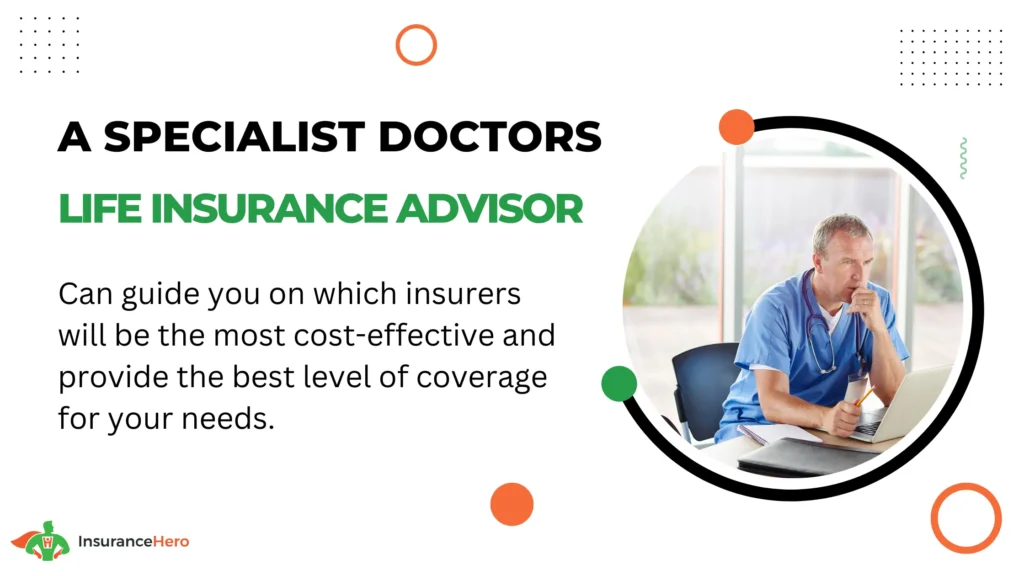Doctors Life Insurance For 2025 – Private & NHS

Are you a doctor looking for life insurance? Did you know that your daily activities as a doctor will drive how much your insurance premiums cost?
You may be pleasantly surprised to learn that life insurance for doctors does not have to be expensive. Doctor’s roles are incredibly varied, and by accurately detailing your daily activities, premiums may be lower as you are not paying for potentially higher-risk tasks that you do not undertake.
Our detailed guide will give you the information you need to determine how life insurance benefits you.
Doctors Life Insurance? Reasons to Consider Getting a Free Quote Today:
- Outstanding reviews for customer care
- Policies with excellent rates for shared coverage
- After getting a free quote, you are not obligated to proceed, so you have nothing to lose by discovering how much you could save.
- You can get a policy tailored specifically for doctors, meaning you will be fully protected whatever happens.
Doctors, Protect Your Loved Ones & Plan for the Future With Affordable Cover. Quick Quote Form


What Is Doctor Life Insurance, and Do You Need It?
Life insurance is not a complex insurance solution. At the simplest level, in return for paying regular premiums into a policy, an insurer will provide a sum assured that will pay out should the policyholder die. The payout amount correlates to the premium and is decided at the start of the policy.
The reasons for taking out doctors’ life insurance cover will vary on different personal circumstances, including some of the following:
- Repaying an outstanding mortgage
- The payment of an inheritance tax bill when you die
- The repayment of personal loans, car loans, and other debt
- Give your family a lump sum to maintain their lifestyle should you die.
How Much Life Insurance Do You Need as a Doctor?
There is no one-size-fits-all answer to this question, as the amount of coverage you need will depend on your age, health, lifestyle, and financial obligations.
The example below illustrates sample level and decreasing term policy quotes for a non-smoking Doctor needing £100k of coverage:
| Age Of Applicant | Level Term Life Insurance (Over Ten Years) | Decreasing Term Life Insurance (Over Ten Years) |
|---|---|---|
| 25 | £4.33 | £4.82 |
| 30 | £4.92 | £4.79 |
| 35 | £6.23 | £5.14 |
| 40 | £8.17 | £6.18 |
| 45 | £11.46 | £8.21 |
| 50 | £16.19 | £11.21 |
For Doctors interested in larger policies, the tables below illustrate the cost of a 250k level term policy for a smoker and non-smoking applicant:
We have also included the cost of a policy with an added “Critical Illness” rider.
Cost of life insurance for a doctor who doesn’t smoke or vape
| Age | £250,000 Level Term Life Insurance (For a 20-period) | £250,000 Level Term Life Insurance + £60,000 Critical Illness (over 20 years) |
|---|---|---|
| 25 years | £5.19 | £13.03 |
| 35 years | £10.04 | £25.16 |
| 45 years | £18.86 | £51.09 |
| 55 years | £52.84 | £98.75 |
Cost of life insurance for a doctor who currently smokes or uses e-cigarettes
| Age | £250,000 Level Term Life Insurance (Over 20 years) | £250,000 Level Term Life Insurance + £60,000 Critical Illness (Over 20 years) |
|---|---|---|
| 25 years | £9.51 | £16.53 |
| 35 years | £20.52 | £38.46 |
| 45 years | £48.12 | £93.54 |
| 55 years | £110.16 | £197.31 |
What are your age and health status?
Health status and age are the two most significant factors in determining how much life insurance you need. You can get away with a smaller policy if you’re young and healthy.
However, the odds of developing health problems increase with age. That’s why it’s essential to reassess your life insurance needs regularly.
What are your current debts and future financial obligations?
Your current debt and future financial obligations are another major consideration when determining how much life insurance you need. If you have a mortgage or other significant debt, your family will need enough life insurance to cover those payments if you die.
In addition, you will also need to consider any future financial obligations, such as a child’s education. By taking a thorough inventory of your debts and future expenses, you can better understand how much life insurance you need to protect your loved ones financially.
Do you have any dependents?
If you have a spouse or children who rely on your income, you will need enough life insurance to cover their financial needs in the event of your death.
This includes mortgage payments, school and university fees, and everyday living expenses. You may not need as much life insurance if you don’t have any dependents.
Do you own a home or other property?
If you own a property, you must ensure that your policy is large enough to cover the mortgage or other debts.
What are your current income and your projected future earnings?
When determining how much life insurance you need as a doctor, a key factor is your current income.
This will give you an idea of how much your family will need to maintain their standard of living if you die. In addition, you should also factor in any future earnings potential.
This is especially important if you are still in training or plan to further your career.
Consider your current and future earnings potential to get a more accurate estimate of how much life insurance you need.
These are just some factors that can affect the relevant life insurance you need. Ultimately, the best way to determine the right amount of coverage for you is to speak with one of our team at Insurance Hero.
Another factor affecting how much life insurance you need is whether you work for the NHS or are a private doctor.
Generally, those who work for the NHS will need less coverage than those in private practice or private hospitals. As already discussed, the NHS pension scheme provides death-in-service benefits, which pay out a lump sum to cover funeral costs and any outstanding debts.
Compare Life Insurance Quotes For Doctors


Is Being a Doctor a Higher Risk Profession?
The risks involved in being a doctor can be wide-ranging and relate directly to how an insurer assesses risk in the workplace when providing a quote.
An NHS doctor working in A+E has a risk profile different from a GP in private practice.
Potential dangers of working as a doctor include exposure to toxic substances, infectious diseases, risk of injury and psychological issues.
From an insurer’s perspective, the full extent of a doctor’s activities must be understood and considered to provide a premium quote accurately representing the level of occupational risk.
Life Insurance For Doctors. How Can Insurance Hero Help?
Insurance Hero is a trusted broker that works with a wide range of specialist insurers that provide policies to higher-risk occupations, including doctors.
Our experience lies in providing insurers with the information they require to make an accurate risk assessment. We make sure that our part of the quote process is robust. We want you to have a policy that will pay out, and we do this through a thorough fact-finding process.
A questionnaire lets us fully understand the extent of your work-related activities, which we pass on to the insurer. Our professional but friendly team will ask you detailed questions to make sure we get your details correct the first time.
What Questions Do We Ask to Get a Doctors Insurance Quote?
With the advent of COVID-19, the questions that we ask are more comprehensive and may include some of the following questions:
- What type of doctor are you?
- Do you have exposure to COVID patients?
- How many hours do you work in a week?
- Do you work with dangerous equipment?
- Do you work night shifts?
- How old are you?
- Do you have any underlying medical conditions?
NHS and Private Practice Considerations
NHS doctors may have differing life insurance requirements from private practice doctors. The death in service (DIS) benefit that is part of the NHS pension scheme provides a financial lump sum should you die in service.
It may be sufficient to cover your doctor’s insurance requirements. If not, you may need to bridge the gap if the DIS level does not match the level of cover you require (for example, a more substantial mortgage), and advice is widely available.
NHS Coronavirus Life Assurance Scheme
The NHS coronavirus life assurance scheme was introduced during the COVID-19 pandemic. Due to frontline work, this scheme will pay £60,000 to the families of NHS workers who died from coronavirus.
This scheme aims to provide financial assistance to the families of NHS workers who have died due to the pandemic.
However, this sum isn’t likely sufficient, as it would only provide limited financial protection.

Best Life Insurance For Doctors Coverage Options
NHS doctors choose to top up their death-in-service benefits, and GPs working in private practices can select which type of life insurance to implement.
Term Life Insurance
Term insurance is the provision of insurance cover for a fixed-term duration. Typically, it is put in place to protect against a specific financial commitment should you die.
A mortgage is one reason for setting up a term life insurance policy where the maturity date of both the mortgage and the policy match, meaning if you die, the mortgage still repays.
Increasing Cover
An increasing cover is a doctor’s life insurance option where the premium increases with the rise in inflation; typically, this is calculated by tracking a benchmark such as the UK Consumer Price Index (CPI).
Increasing cover is a good option for doctors who want to ensure that their life insurance coverage keeps pace with the rising cost of living.
Decreasing Cover
Decreasing cover means the level of financial protection reduces throughout the policy. It is usually associated with a repayment mortgage, where the principal slowly diminishes over time, and only interest is paid off in the end.
Decreasing cover life insurance for doctors can be cheaper than an equivalent level of term assurance, which offers level cover for a set period.
Level Life Cover
With level cover, the premium stays the same throughout the fixed-term insurance policy and is not affected by the effects of inflation. As the premium remains the same for the duration of the policy, it makes it easy to budget for your life insurance.
Whole of Life Insurance
A life insurance option that differs from term insurance as it is open-ended. Whole of life insurance pays out when you die, and there is no time scale as it is an open-ended plan. Whole of life insurance for doctors generally costs more than term insurance.
Considerations When Taking Out a Life Insurance Policy
Many life insurers offer policies that provide coverage for doctors, but any plan must closely match your needs.
The four key considerations to take into account to ensure a robust plan is in place include the following:
Policy length: Depending on your age when you take out a policy, the longer the term, the more expensive the premiums. As you get older, your risk of illness or disease increases.
Policy type: A whole of life policy tends to be more expensive than term insurance as it pays out when you die and does not require a plan to pay out within set dates.
Sum assured: As the sum assured or the payout amount increases, the cost of cover also increases.
Pre-existing conditions: An insurer will need to know about any adverse medical history or underlying medical conditions. It could result in a medical condition being excluded from a policy or increasing the cost of cover.
Other Associated Doctors’ Life Insurance Products
Life insurance is closely related to other types of protection products. The two most common are doctor’s income protection cover and critical illness.
Doctor Income Protection Insurance
An income protection policy provides a replacement salary if you cannot work due to an accident, injury, or illness.
It provides you with the financial peace of mind that all bills are still paid, allowing you to focus on your recovery and return to the workplace.
NHS statutory sick pay is quite comprehensive and is unlikely to warrant a private policy top-up. Depending on the length of NHS service, a doctor with more than five years of employment would receive sick pay for up to a year, with the first six months at full salary and the remainder at half pay.
For doctors working in private practice, income protection cover is a more relevant consideration.
Private income protection cover rarely covers 100% of your salary. Levels typically cap between 70% and 80% of your income. This encourages you to return to the workplace and not benefit financially from being off work.
Critical Illness Cover for Doctors
Critical illness cover provides financial protection should you no longer be able to work due to the diagnosis of a qualifying disease, illness, or other ill health.
Unlike life insurance, you do not have to die to receive a lump sum payout, but you do need to survive at least 10-14 days from diagnosis, depending on the insurer.
Critical illness insurance allows for your ongoing care with the peace of mind that you are entirely covered financially, so if you have loved ones, they will not have a financial burden to shoulder.
Types of qualifying illnesses include but are not limited to the following:
- Cardiac arrest
- Benign brain tumour
- Traumatic brain injury
- Primary pulmonary hypertension
- Progressive supranuclear palsy
- Paralysis of a limb
- Multiple system atrophy
- Loss of speech
- Multiple sclerosis coverage
- Liver failure
- Heart valve replacement or repair
- Loss of hand or foot
- Major organ transplant
- Third-degree burns
- Systemic lupus erythematosus
- Alzheimer’s disease or pre-senile dementia
Family Income Benefit
Family Income Benefit (FIB) is another type of policy that can benefit doctors. Unlike a regular life insurance claim, this type of policy pays out a regular income to your family in the event of your death, which can help them cover everyday living expenses.
The money can help with everyday living costs, mortgage payments, or other expenses.
Life Insurance for Doctors – The Benefits
While it’s not just doctors who can benefit from life insurance, it is an important consideration for medical professionals.
In summary, the benefits include:
- It can provide financial security for your loved ones during your death.
- It can help to pay off any outstanding debts, such as a mortgage, in the event of your death.
- Knowing that your loved ones will be taken care of financially if something happens to you can provide peace of mind.
- It can help your family maintain their standard of living if you are no longer around to provide an income.
- Additional policies, such as critical illness cover, can provide additional protection for you and your family.
Final Tips for Life Insurance for Doctors
Keep healthy—While medical professionals are busy caring for others, it is also important to remember to take care of themselves. Staying healthy will help keep premiums down.
Regular reassessments – As mentioned earlier, it is crucial to reassess your life insurance needs regularly. This is especially true for medical professionals, as their needs can change quickly. By staying up-to-date on your life insurance policy, you can ensure that you and your family are always protected.
Put your life insurance policy in trust – The money will go directly to the trustees, who will then distribute it according to your wishes. This can be an excellent way to avoid inheritance tax and probate and ensure that the money goes exactly where you want it to.
Only take out the insurance cover you need – Don’t pay premiums for coverage you’ll never use. Work out how much you need, and then find a suitable policy.
Get advice – If you’re unsure how much life insurance you need, it’s a good idea to speak to someone who can help you assess your needs and find the right policy. That’s where Insurance Hero comes in to help you find the best life insurance for your particular circumstances.
For more information on doctors life insurance and associated products, contact Insurance Hero. Our professional but friendly team is expert in providing you with a quote that is not only competitive but also carefully tailored to your requirements, meaning you only pay for what you need. Please get in touch with us today at 0203 129 88 66 for a no-obligation quote.
Conclusion
Doctors life insurance can be an essential type of financial protection for doctors.
With the rise of COVID 19 and its risks for frontline medical staff, doctors already used to working in higher-risk environments now face another reason to provide financial protection for their families and loved ones should they die.
Research Sources:
- Medical Economics: Generational wealth for health care professionals
- British Medical Journal: Life Insurance after disease exposure
- SOA: Life Insurance research reports
Steve Case is a seasoned professional in the UK financial services and insurance industry, with over twenty years of experience. At Insurance Hero, Steve is known for his ability to simplify complex insurance topics, making them accessible to a broad audience. His focus on clear, practical advice and customer service excellence has established him as a respected leader in the field.


